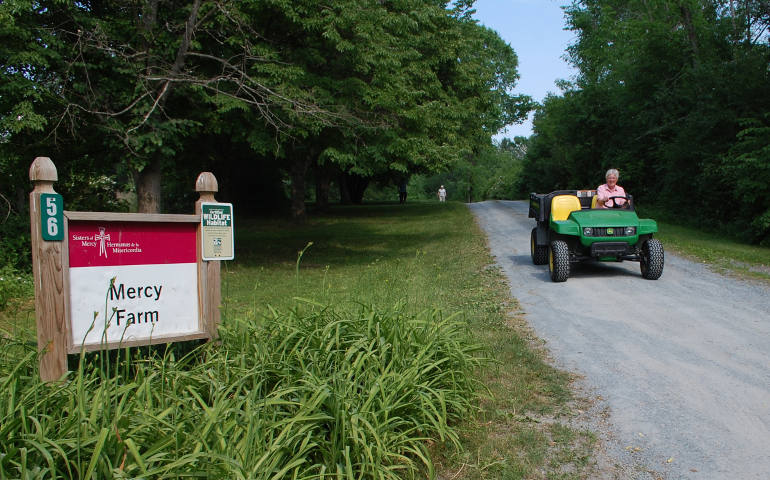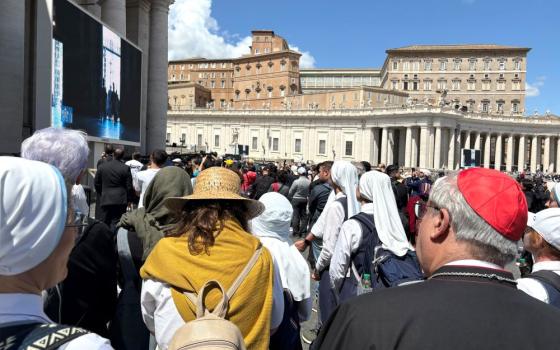
Mercy Sister Mary Quinn drives a farm vehicle at Mercy Farm in Benson, Vt., June 20. (CNS/Cori Fugere Urban, Vermont Catholic magazine)
At Mercy Farm in Benson, Mercy sisters are creating a place where people can experience peace and quiet and a sense of contemplation, reverence and care for the earth.
Here the importance of the earth and its care are emphasized, and visitors are encouraged to find ways they can care for it: organic gardening, recycling, composting, using solar power and reusing, for example.
Here visitors can experience God in creation; one college student returned to her Catholic faith after a visit to the farm.
Three Mercy sisters live on the farm that was once Lumen Christi retreat center and before that a Benedictine residence: Sr. Elizabeth Secord has been at the farm since 2013 and is the program manager; Sr. Holly Cloutier, the farm manager, as been here since 2010; and Sr. Mary Quinn, the business manager, has lived here since 2013.
Here in the quiet, "God has a chance to get through," Secord told Vermont Catholic, the magazine of the Burlington.
There is a plaque in the farm kitchen that reads, "Let us be silent that we may hear the whisper of God."
Officially known as Mercy Ecology Inc. at Mercy Farm, it offers self-directed and directed retreats; group rentals, including recovery retreats and yoga; school programs including the Classroom Around Us and Human Impact on the Landscape; liturgical programs; and farm experiences, like preparing gardens, planting and stacking wood. Staff members also help visitors design their own programs on topics such as canning, bread-making and quilting.
The sisters care for the earth through environmental education, organic gardening and sustainable living practices that include solar energy for about 85 percent of their electric needs.
Located on 39 acres -- including eight conserved acres -- the farm facilities include six bedrooms and three bathrooms for guests, a chapel/meeting room, a library, an art room and quiet space. There is a bee yard with hives and a barn with 20 solar panels. Two sheep -- Bailey and Dexter -- and numerous egg-laying hens live on the farm that draws guests from throughout the Northeast and from as far away as the Southern states and England, Australia and Guam.
Produce from the gardens is used for guests, donated to Vermont's Fair Haven Concerned Food Shelf and shared with neighbors.
Visitors sometimes work in the gardens.
"We help (visitors) reverence the earth and get a sense of the earth," Secord said.
Owned by the Sisters of Mercy of the Northeast for more than a dozen years, the property is now focused on ecology; "healing of the earth" is a focus of the religious order once primarily engaged in teaching and now also focused on women and children.
"We want to help people understand that the materialism and consumerism people experience causes us to be greedy," Secord said. "We want to help them understand the need to cut back on some of our consumption."
She said that even though people have many "things," many are still not spiritually fulfilled: "People still feel hungry and empty."
The sisters hope to help people realize more and more that things they buy cannot fulfill them. "If you are connected to the earth, you're fulfilled," she said. "I see God in the Earth. I see God in all of life."
In his encyclical, "Laudato Si', on Care for Our Common Home," Pope Francis wrote: "The entire material universe speaks of God's love, his boundless affection for us. Soil, water, mountains: everything is, as it were, a caress of God."
Marking the first anniversary of Francis' encyclical on the environment, the Pontifical Council for Justice and Peace launched a new website dedicated to the document and efforts throughout the world to put its teaching into practice.
The site -- www.laudatosi.va -- "witnesses not only to the impact of the encyclical, but also the creativity and generosity of the people of God everywhere in the world," Cardinal Peter Turkson, council president, said at the time.
The Sisters of Mercy, said Quinn, consider care of the earth a "critical concern."
They seek to address that concern through mercy and ecology. "Mercy is compassion" and includes "compassion for earth and all living things," Secord said.
"Doomsday predictions can no longer be met with irony or disdain. We may well be leaving to coming generations debris, desolation and filth," the pope wrote.
People need to "get with it," Cloutier said, and realize the severity of climate change and humans' effect on the earth.
"Many things have to change course, but it is we human beings above all who need to change," the pope said.
Editor's note: Want more stories from Eco Catholic? We can send you an email alert once a week with the latest. Just go to this page and follow directions: Email alert sign-up.

